Contents
This article needs additional citations for verification .(December 2015) |
| |||||
| Decades: | |||||
|---|---|---|---|---|---|
| See also: | Other events of 1931 History of Germany • Timeline • Years | ||||
Events in the year 1931 in Germany .
This article needs additional citations for verification .(December 2015) |
| |||||
| Decades: | |||||
|---|---|---|---|---|---|
| See also: | Other events of 1931 History of Germany • Timeline • Years | ||||
Events in the year 1931 in Germany .

Der Stahlhelm, Bund der Frontsoldaten, commonly known as Der Stahlhelm, was a German First World War veteran's organisation existing from 1918 to 1935. In the late days of the Weimar Republic, it was closely affiliated to the monarchist German National People's Party (DNVP), placed at party gatherings in the position of armed security guards.
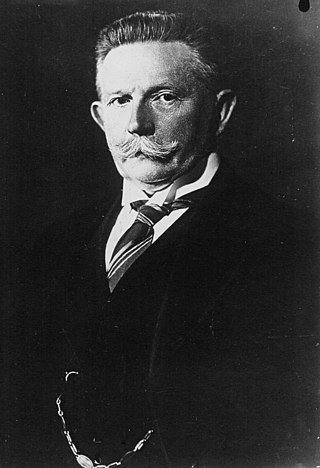
Alfred Ernst Christian Alexander Hugenberg was an influential German businessman and politician. An important figure in nationalist politics in Germany during the first three decades of the twentieth century, Hugenberg became the country's leading media proprietor during the 1920s. As leader of the German National People's Party, he played a part in helping Adolf Hitler become chancellor of Germany and served in his first cabinet in 1933, hoping to control Hitler and use him as his tool. The plan failed, and by the end of 1933 Hugenberg had been pushed to the sidelines. Although he continued to serve as a guest member of the Reichstag until 1945, he wielded no political influence. Following World War II, he was interned by the British in 1946 and classified as "exonerated" in 1951 after undergoing denazification.

The German National People's Party was a national-conservative and monarchist political party in Germany during the Weimar Republic. Before the rise of the Nazi Party, it was the major nationalist party in Weimar Germany. It was an alliance of conservative, nationalist, monarchist, völkisch, and antisemitic elements supported by the Pan-German League. Ideologically, the party was described as subscribing to authoritarian conservatism, German nationalism, monarchism, and from 1931 onwards also to corporatism in economic policy. It held anti-communist, anti-Catholic, and antisemitic views. On the left–right political spectrum, it belonged on the right-wing, and is classified as far-right in its early years and then again from the late 1920s when it moved back rightward.
The Timeline of the Weimar Republic lists in chronological order the major events of the Weimar Republic, beginning with the final month of the German Empire and ending with the Nazi Enabling Act of 1933 that concentrated all power in the hands of Adolf Hitler. A second chronological section lists important cultural, scientific and commercial events during the Weimar era.

Presidential elections were held in Germany on 29 March 1925, with a runoff on 26 April. They were the first direct elections to the office of President of the Reich, Germany's head of state during the 1919–33 Weimar Republic. The first President, Friedrich Ebert, who had died on 28 February 1925, had been elected indirectly, by the National Assembly, but the Weimar Constitution required that his successor be elected by the "whole German people". Paul von Hindenburg was elected as the second president of Germany in the second round of voting.

Presidential elections were held in Germany on 13 March 1932, with a runoff on 10 April. Independent incumbent Paul von Hindenburg won a second seven-year term against Adolf Hitler of the Nazi Party (NSDAP). Communist Party (KPD) leader Ernst Thälmann also ran and received more than ten percent of the vote in the runoff. Theodor Duesterberg, the deputy leader of the World War I veterans' organization Der Stahlhelm, ran in the first round but dropped out of the runoff. This was the second and final direct election to the office of President of the Reich, Germany's head of state under the Weimar Republic.
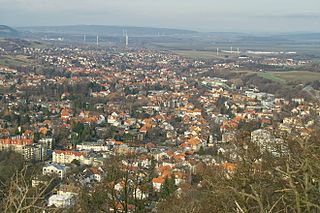
Bad Harzburg is a spa town in central Germany, in the Goslar district of Lower Saxony. It lies on the northern edge of the Harz mountains and is a recognised saltwater spa and climatic health resort.
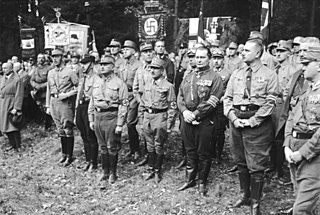
The Harzburg Front was a short-lived radical right-wing, anti-democratic political alliance in Weimar Germany, formed in 1931 as an attempt to present a unified opposition to the government of Chancellor Heinrich Brüning. It was a coalition of the national conservative German National People's Party (DNVP) under millionaire press-baron Alfred Hugenberg with Adolf Hitler's National Socialist German Workers' Party (NSDAP), the leadership of Der Stahlhelm paramilitary veterans' association, the Agricultural League and the Pan-German League organizations.

The Free State of Prussia was one of the constituent states of Germany from 1918 to 1947. The successor to the Kingdom of Prussia after the defeat of the German Empire in World War I, it continued to be the dominant state in Germany during the Weimar Republic, as it had been during the empire, even though most of Germany's post-war territorial losses in Europe had come from its lands. It was home to the federal capital Berlin and had 62% of Germany's territory and 61% of its population. Prussia changed from the authoritarian state it had been in the past and became a parliamentary democracy under its 1920 constitution. During the Weimar period it was governed almost entirely by pro-democratic parties and proved more politically stable than the Republic itself. With only brief interruptions, the Social Democratic Party (SPD) provided the Minister President. Its Ministers of the Interior, also from the SPD, pushed republican reform of the administration and police, with the result that Prussia was considered a bulwark of democracy within the Weimar Republic.
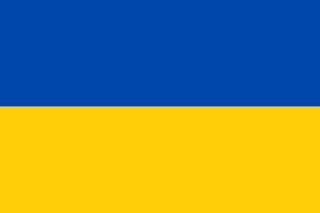
The Free State of Brunswick was a state of the German Reich in the time of the Weimar Republic. It was formed after the abolition of the Duchy of Brunswick in the course of the German revolution of 1918–1919. Its capital was Braunschweig (Brunswick). In 1933 it was de facto abolished by Nazi Germany. The free state was disestablished after the Second World War in November 1946.

This is a list of members of the 4th Reichstag – the parliament of the Weimar Republic, whose members were elected in the 1928 federal election and served in office from 1928 until its dissolution in 1930.
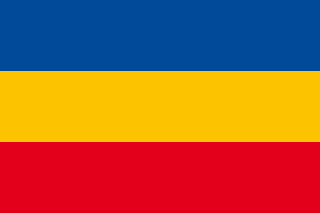
The Free State of Mecklenburg-Strelitz was a state of the Weimar Republic established in 1918 following the German Revolution which had overthrown the Grand Duchy of Mecklenburg-Strelitz. The state lasted until the Nazi Party (NSDAP) came to power in Germany and merged the state with the neighbouring Free State of Mecklenburg-Schwerin to form a united state of Mecklenburg on 1 January, 1934.
The Agricultural League or National Rural League was a German agrarian association during the Weimar Republic which was led by landowners with property east of the Elbe. It was allied with the German National People's Party and later the National Socialist German Workers' Party

Gottfried Reinhold Treviranus was a German politician from the Conservative People's Party and a Reichsminister in both of Chancellor Heinrich Brüning's cabinets. In the first he was Minister for the Occupied Territories and then Minister without Portfolio ; in the second, he served as Minister of Transport.
Events in the year 1930 in Germany.
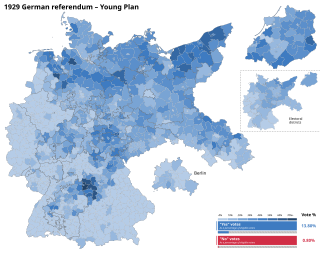
The 1929 German Referendum was an attempt during the Weimar Republic to use popular legislation to annul the agreement in the Young Plan between the German government and the World War I opponents of the German Reich regarding the amount and conditions of reparations payments. The referendum was the result of the initiative "Against the Enslavement of the German People " launched in 1929 by right-wing parties and organizations. It called for an overall revision of the Treaty of Versailles and stipulated that government officials who accepted new reparation obligations would be committing treason.

The 1931 Prussian Landtag referendum was an attempt to prematurely dissolve the sitting session of the Landtag (parliament) of the Weimar German state of Prussia. The referendum, which took place according to Article 6 of the 1920 Prussian Constitution, was triggered by a petition launched in the spring of 1931 by the anti-republican veterans' organization Der Stahlhelm. It was supported by several right-wing parties including the Nazis, as well as by the Communist Party of Germany (KPD). Even though 93.9% of those voting on 9 August 1931 opted to dissolve the Landtag, the referendum failed because the turnout of 39.2% did not meet the minimum 50% requirement.
The presidential cabinets were a succession of governments of the Weimar Republic whose legitimacy derived exclusively from presidential emergency decrees. From April 1930 to January 1933, three chancellors, Heinrich Brüning, Franz von Papen, and Kurt von Schleicher were appointed by President Paul von Hindenburg, and governed without the consent of the Reichstag, Germany's lower house of parliament. After Schleicher's tenure, the leader of the Nazis Adolf Hitler succeeded to the chancellorship and regained the consent of the Reichstag by obtaining a majority in the March 1933 German federal election with DNVP.

The second Brüning cabinet, headed by Heinrich Brüning of the Centre Party, was the eighteenth democratically elected government during the Weimar Republic. It took office on 10 October 1931 when it replaced the first Brüning cabinet, which had resigned the day before under pressure from President Paul von Hindenburg to move the cabinet significantly to the right.